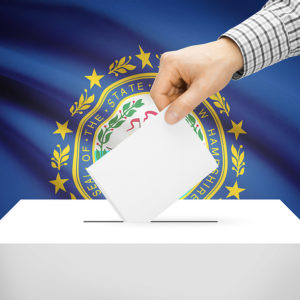WMUR’s John DiStaso has some excellent reporting on Monday’s House Election Law hearing on voter law reforms proposed in Concord. DiStato does a good job allowing both sides to make their own cases on issues of residency, voter ID, and absentee ballots, etc.
As a result, it’s hard to avoid the conclusion that, no matter where you come down on the specific issues, both sides have legitimate concerns. Participating in democracy shouldn’t be unnecessarily difficult. But asking people to show ID before they vote doesn’t seem excessive.
Out-of-state college students do spend about 9 months a year in New Hampshire, so why not let them vote here? At the same time, should people who literally view themselves as “out-of-state residents” with out-of-state drivers licenses really be picking the local school board?
All good questions. All legit points of debate. And all a total waste of time.
Why? Because a narrow majority of congressional Democrats voted to settle these questions in Washington, D. C. last week. Thanks to the passage of H.R. 1, with the backing of both Reps. Annie Kuster and Chris Pappas, House Democrats have voted to strip Granite State voters and their elected representatives of the power to decide these things for themselves.
Forget “all politics is local.” Under H.R. 1, all local politics is now national.
On Monday, Sen. Maggie Hassan tweeted “Despite a safe & secure election last fall, a slew of anti-voter bills are being considered today in the NH legislature. These bills will undermine free and fair elections.” Maybe, maybe not. But Hassan will almost certainly vote for H.R. 1, which will not just undermine but completely override the rights of Granite Staters to run their own elections.
This isn’t partisan spin or a subject of debate. H.R. 1 is very clear. Its own supporters acknowledge the bill, if it becomes law, will end all sorts of common — and in many cases, popular — election policies.
Pappas, for example, calls the legislation “transformative” and celebrates it for:
- Expanding automatic voter registration and same-day registration.
- Strengthening vote by mail, early voting, and ballot access.
- Fixing partisan gerrymandering.
All three of these are, in fact, federal laws overriding the local decisions of Granite State voters. For example, New Hampshire has chosen to use same-day registration and access to provisional ballots as the backstops to guarantee the right to vote — as opposed to early voting or automatic voter registration or mail-in elections. Is New Hampshire right? Or should the state go from an “Election Day” to an “Election Month,” with 15 days of early voting and a mandate that ballots received 10 days after the election must be counted?
Doesn’t matter. If Congress passes H.R. 1, the latter will be the law of the land, overriding the will of the people in New Hampshire and the other 49 states.
The same is true with “fixing partisan gerrymandering.” Kuster echoes House leadership when she says, “this legislation ends partisan gerrymandering to ensure that the American people are picking their elected representatives, and not the other way around.” Ironically, the current system of drawing legislative lines involves letting the voters pick (aka “elect”) the people who draw them (aka “legislators”). Democrats like Kuster, on the other hand, just voted to take away that system and replace it with panels of politically-connected bureaucrats the voters don’t get to pick.
And it’s clear based on the lack of burning torches and pitchforks in the streets that most NH voters haven’t figured out Congress just voted to make them pay for politicians’ re-election campaigns. According to the National Republican Congressional Committee, the H.R. 1 campaign financing system would mean an average of $7.2 million in public money for Kuster, Pappas, and the rest of the incumbents.
That’s $7.2 million each.
Do Granite Staters really want hundreds of millions of dollars to go to negative campaign ads and sketchy Facebook posts of Jesus arm-wrestling Satan? Or as Kuster calls it, “fighting big money in politics.” To most Granite Staters, $7 million sounds like “big money” — particularly when it’s their money.
New Hampshire voters offended by billionaire campaign donors (most of whom, ironically, overwhelmingly donate to Democrats) can always choose to donate to their own money and help balance the power. The state of New Hampshire could, if it chose, set aside tax dollars for campaign mailers putting Trump’s head on every Republican candidate’s body.
But once again, what’s the point of Congress is just going to federalize the election process?
A group of 20 attorneys general have sent a letter claiming H.R. 1 is unconstitutional. Maybe. But it’s easy to believe that if the average Granite Stater finds out they’re no longer in charge of their elections, the bill is going to be unpopular.





